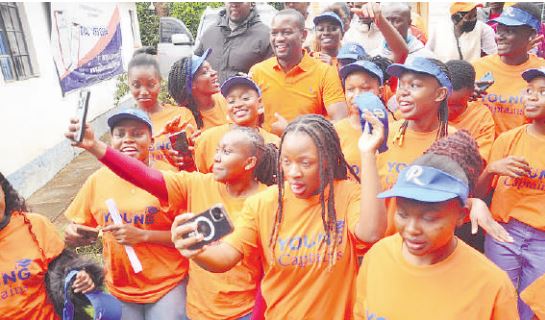
 ODM secretary general Edwin Sifuna with youths during the relaunch of Young Captains chapter /ODM
ODM secretary general Edwin Sifuna with youths during the relaunch of Young Captains chapter /ODM
ODM has rolled out a strategic plan to tap into the Gen Z demographic as it lays groundwork for 2027 general election.
On Saturday, the party relaunched its Young Captains chapter—a wing within the ODM Women League, comprising young women from institutions of higher learning.
Currently, political parties are fighting for the youth vote— a significant demographics whose sway is believed could influence the 2027 polls.
The relaunch event, held in Nairobi, was attended by Secretary General Edwin Sifuna, Women's League President Senator Beth Syengo and Youth League Leader Mark Ketora.
Gen Z representatives said the revival of the Young Captains 2025 chapter, following its initial launch in 2021, is part of broader efforts to expand ODM’s membership base nationwide.
Syengo underscored the importance of involving youth in political processes and leadership.
“You are going to be part and parcel of the decision-making group in this country within the ODM party,” she told the young women. “From today, you have become advertising agents for ODM. I started this chapter to have young people to assist Raila reach every corner of this country.”
She urged youth leaders to return to their campuses and recruit peers into the party, rejecting the notion that Gen Z are “leaderless and partyless.”
Sifuna, who is also the Nairobi Senator, said he personally benefited from the group during his 2022 campaign and praised Gen Z for their renewed political interest.
“They are very eager to register as voters so that their voice can be heard, loud and clear,” he said.
Sifuna emphasised the power of youth participation in political parties and governance, noting that decisions are often made by leaders disconnected from young people’s lived realities.
“The first time I got my voting card was in 2002 when I was 20 years old. I was among the youths who went to Uhuru Park to sing Yote Yawezekana Bila Moi [all is possible without Moi] because we were living in fear and did not want to continue living that way. So, when I got the voting card, my goal was to send Moi home by bringing down KANU,” he said.
“Even now, there are conversations underway. My party leader has proposed an intergenerational dialogue—because it is only the youth who truly understand the challenges they face.”
The secretary general said Gen Z would be a defining force in the 2027 election and urged them to register as voters in large numbers and actively seek elective positions.
“You have to be bold. Our country is in a crisis and we have a responsibility—because history will judge us. As leaders, you have to speak out. The country is in a bad place,” Sifuna said.
ODM’s renewed push comes amid heightened competition among political players to win over the youth bloc ahead of 2027.
Wiper leader Kalonzo Musyoka has in recent weeks made overtures to the youth, including offering legal support to those arrested during the Saba Saba protests.
President William Ruto, who has faced Gen Z backlash since June last year, has also intensified efforts to court young people through empowerment initiatives and job creation promises.
Last week, Ruto unveiled an ambitious plan to create 1.4 million jobs targeting the youth, saying his administration has a “comprehensive strategy” to address youth unemployment.
Among the initiatives, the government is scaling up opportunities under the affordable housing programme from 300,000 to 600,000 jobs and an additional 200,000 youth are being engaged in the Climate WorX initiative.
INSTANT ANALYSIS
By 2027, it is estimated that the 18‑34 age bracket is projected to include 17.8 million voters, forming roughly 40–45 per cent of the electorate. Out of this, Gen Z alone will account for 14+ million eligible voters, almost equalling—or even surpassing—the margins that decided the 2022 election. Gen Z voters’ detachment from ethnic-based politics may weaken traditional regional vote banks ("tyranny of numbers") and force campaigns to prioritize policies and integrity over identity politics. Analysts opine that even if Gen Z doesn't rally around a single candidate, their mass turnout and volatility—driven by grievances like youth unemployment and high living costs—could swing the balance in close races.












